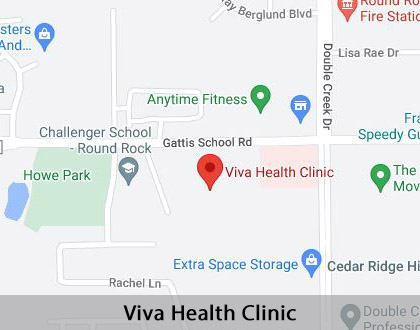Birth Control Round Rock, TX
Birth control is not a one-size-fits-all treatment. Every woman's body is different and may react differently with each type of medication or solution, especially within the reproductive system. There are various birth control options for women of all ages and religious backgrounds of varying beliefs, preferences, and ideologies.Almost all women find a solution that works for them, from medications (like the pill) to internal devices, such as an IUD, diaphragm, or cervical cap.
Birth control is available at Viva Health Clinic in Round Rock and the surrounding area. We can help go over the various birth control options and determine which option is the most effective choice for your needs. Call us today at (512) 243-5872 to schedule an appointment or learn more about our services.
Types of Birth Control Options
Birth control consists of various medications and solutions used to prevent pregnancy. The effectiveness of each type of birth control option depends on how a patient uses it. Each option has advantages and disadvantages, maintenance requirements, effectiveness when taken properly, side effects, and risk factors.
The 18 methods of birth control, in order of effectiveness, are as follows:
- Lifestyle habits: abstinence & outercourse (100% effective); breastfeeding (98% effective); withdrawal (78% effective); fertility awareness (76-88% effective)
- Permanent birth control: sterilization and vasectomy (99% effective)
- Birth control implant: lasts up to 5 years; 99% effective; low to no maintenance
- IUD: lasts for 3-12 years; 99% effective; low maintenance
- Birth control shot: taken every 3 months; 94% effective; some maintenance (scheduled)
- Birth control vaginal ring: replaced monthly; 91% effective; some maintenance (scheduled)
- Birth control patch: replaced weekly; 91% effective; some maintenance (scheduled)
- Birth control pill: taken daily; 91% effective; some maintenance (scheduled)
- Diaphragm: use every time; 88% effective; high maintenance
- Condom: used every time; 85% effective; high maintenance
- Internal condom: used every time; 79% effective; high maintenance
- Birth control sponge: use every time; 76-88% effective; high maintenance
- Spermicide & gel: use every time; 72-86% effective; high maintenance
- Cervical cap: use every time; 71-86% effective; high maintenance
“Birth control consists of various medications and solutions used to prevent pregnancy.”
Finding the Right Treatment for You
There are several factors to consider when looking for the right birth control treatment. It is important for partners to discuss these factors together and speak with a primary care practitioner to determine which options would work best for each person and their current health. With cases in which the woman is alone in the decision, we recommend considering a variety of factors.
The major factors many women take into account are effectiveness (best at preventing pregnancy), ease of use, ease of menstrual pain, prevention of STDs, whether or not a practitioner or nurse is required, and consistency of hormones. A primary care practitioner has the necessary knowledge and medical skill to inform patients of these factors and which would be most important to consider depending on the patient. Patients may also have religious, cultural, or personal beliefs to consider, which should be relayed to their practitioner as well. We recommend creating a simple chart or table with narrowed-down choices to list the pros and cons of each.
“The major factors many women take into account are effectiveness (best at preventing pregnancy), ease of use, ease of menstrual pain, prevention of STDs, whether or not a practitioner or nurse is required, and consistency of hormones.”
The Birth Control Treatment Plan
Each patient's birth control treatment plan will differ according to the option they choose. We will discuss the birth control options viable for the patient during the consultation appointment. Once the patient has chosen an option, we will go over the treatment plan in detail. It may be a good idea to consider the treatment plans prior to making a decision, as some birth control options are permanent while others require little to no maintenance, and the majority require high maintenance and remembrance.
Abstinence and outercourse, or non-penetrative sex, require no treatment plan and are the only options that are 100% effective. Permanent birth control options are the next most effective option, requiring a simple surgery. Female sterilization, or tubal ligation, involves tying the fallopian tubes to prevent an egg from entering the uterus. Male sterilization, or vasectomy, involves cutting and sealing the vas deferens to prevent the production of sperm.
Aside from permanent birth control options, temporary fixes can last from years to months to weeks or days. Birth control implants last for up to five years, and an IUD can last from three to 12 years, requiring no maintenance. The shot is taken every three months, the vaginal ring changed every month, the patch every week, and the pill every day, requiring little maintenance. All of the other options are used during each encounter and require high maintenance.
“It may be a good idea to consider the treatment plans prior to making a decision, as some birth control options are permanent while others require little to no maintenance and the majority require high maintenance and remembrance.”
Check out what others are saying about our primary care practitioner services on Yelp: Birth Control in Round Rock, TX
Benefits of Receiving Professional Care & Risks of Treatment
Seeking professional care from a qualified practitioner through contraceptive counseling empowers women to find the right birth control option and use it correctly and consistently. According to this Contraceptive Counseling article, "the proportion of pregnancies in the United States (US) that are unintended has remained stubbornly high at approximately 50%." A primary care practitioner acknowledges their patients' health standing and is aware of their sensitivities, allergies, previous and current conditions, and medications they are taking.
Birth control offers a wide range of benefits preventing pregnancy. Birth control methods, when taken properly, can regulate a patient's period and even reduce pain and other associated symptoms, such as cramps, PMS, PMDD, and anemia. Many forms have been shown to protect against STDs and STIs. They can relieve endometriosis symptoms and prevent ovarian cysts. Some forms of birth control have been shown to clear up the skin (acne) and reduce unwanted hair growth. Lastly, they can help with Polycystic Ovarian Syndrome (PCOS) and reduce one's risk of cancer, including ovarian and endometrial cancers.
There are few treatments that come without risks and side effects. Birth control affects a person's hormone levels, which can cause various side effects, including irregular periods, nausea, breast tenderness, headaches and migraines, weight gain, mood changes, decreased libido, vaginal discharge, and eye changes. Patients who have certain health conditions, such as hypertension, heart disease, and breast or endometrial cancer, may be advised against certain forms of birth control. Long-term effects of birth control may include cardiovascular problems and cancer in some individuals. These risks are determined by a primary care practitioner and are dependent on a person's medical history and current health standing.
“Birth control offers a wide range of benefits beyond preventing pregnancy.”
Questions Answered on This Page
Q. What types of birth control are available?
Q. How do I find the right treatment for me?
Q. What is a birth control treatment plan?
Q. What are the benefits and risks of birth control?
Q. What happens after initiating birth control use?
People Also Ask
Q. Why is preventative medical care important?
Follow-Up Care
Upon choosing the right birth control option and initiating a treatment plan, we will discuss follow-up care with the patient. Follow-up care consists of subsequent visits, monitoring, home management, and emergency visits. This will largely depend on the type of birth control method a patient is using, how their body reacts to it, whether they are using it properly and effectively, and whether they experience any side effects or symptoms during the first two months.
In general, patients who are using a birth control implant or IUD need the least amount of follow-up visits and may only require a follow-up after the first month to ensure it is correctly placed and not causing any concerns. Those who take birth control shots will need to come in every three months to take their shot, and those with a vaginal ring must come in monthly to replace their ring. The patch and pill are typically given in bulk, requiring patients to remember to take or change it every day (pill) or week (patch). There are instructions on what to do if the patient forgets or changes their cycle. Patients on the patch or pill may come in more frequently.
Regardless of birth control type, patients are encouraged to come in regularly in order to ensure their method of choice is working properly and manage their symptoms, if any. Patients with concerns or questions should call the office and ask to speak to their practitioner if the matter does not require an in-person visit. It is important for patients to know and understand how their bodies work and how their birth control affects their bodies. Do not dismiss any signs, no matter how small they might be. We recommend writing down any unusual signs or symptoms, being aware of irregularities in your menstrual cycle, and making sure an internal device is correctly in place.
“Upon choosing the right birth control option and initiating a treatment plan, we will discuss follow-up care with the patient.”
Frequently Asked Questions
Q. How does fertility awareness work?
A. An egg is only available to be fertilized for about 12 to 24 hours after ovulation, according to the American Pregnancy Association. However, sperm can live in the body for three to five days after sex. Add that to the day the egg is available, and your most fertile window rises to approximately five to seven days. In other words, you can get pregnant for about a week.
Q. Does birth control protect against STDs and STIs?
A. Many methods of birth control help reduce the risk of acquiring an STD or STI but do not prevent the risk completely. Condoms are the closest bet to protecting against these diseases. However, they run the risk of being torn or ripped. The only way to fully prevent an STD or STI is abstaining from sex or practicing outercourse.
Q. What are the most common side effects of birth control?
A. The most common side effects are spotting or bleeding between periods, sore breasts, nausea, and headaches. However, each type of birth control differs in its side effects and risk factors. These will be discussed during the initial appointment once a patient chooses their method of choice. Although we disclose the common side effects of the method, everybody is different, and a person may experience other side effects or symptoms. It may take a few months for the body to adapt to the new method as well.
Q. Can birth control cause infertility?
A. Although this misconception has been around for a long time, birth control does not cause infertility. This is true for any method and for however long a person is using it. Birth control only causes a temporary delay in infertility as long as the birth control is being used. Once a person stops using birth control, they can become pregnant.
Q. Is it normal for my period to completely stop after taking birth control?
A. It is common for patients to have a late, irregular, or absent period for a few months when first starting birth control or when changing a method. Some patients experience a complete absence of their period for the duration of birth control use. If this is a concern for you, be sure to discuss this as a factor when choosing a birth control method.
Start Feeling Better – Visit Us Today
By visiting us as soon as possible, our team can help get you the professional treatment you need. Instead of waiting around and allowing the symptoms to get worse, we can provide you with treatment options.
Definition of Medical Terminology
Call Us Today
Unwanted pregnancies can take a toll on any person, mentally and physically. We can help you choose the right birth control treatment for you and your partner. Call us today at 512-243-5872 to schedule an appointment or learn more about our services.
Helpful Related Links
- American Academy of Family Practitioners. American Academy of Family Practitioners. 2023
- American Academy of Pediatrics (AAP). American Academy of Pediatrics (AAP). 2023
- American College of Obstetricians and Gynecologists. American College of Obstetricians and Gynecologists. 2023
- American Medical Association (AMA). American Medical Association (AMA). 2023
- American Pregnancy Association. American Pregnancy Association. 2023
- Health and Human Services Reproductive Health Services and Resources. Health and Human Services Reproductive Health Services and Resources. 2023
- Medline Plus Birth Control. Medline Plus Birth Control. 2023
- Planned Parenthood Birth Control Methods. Planned Parenthood Birth Control Methods. 2023
About our business and website security
- Viva Health Clinic was established in 2023.
- We accept the following payment methods: American Express, Cash, Discover, MasterCard, and Visa
- We serve patients from the following counties: Williamson, Travis, McLennan
- We serve patients from the following cities: Pflugerville, Austin, Kyle, Waco, Leander, Cedar Park, Bastrop, Round Rock, Georgetown, Hutto, Liberty Hill, and Taylor
- National Provider Identifier Database (1104428416). View NPI Registry Information
- Norton Safe Web. View Details
- Trend Micro Site Safety Center. View Details
Back to top of Birth Control










